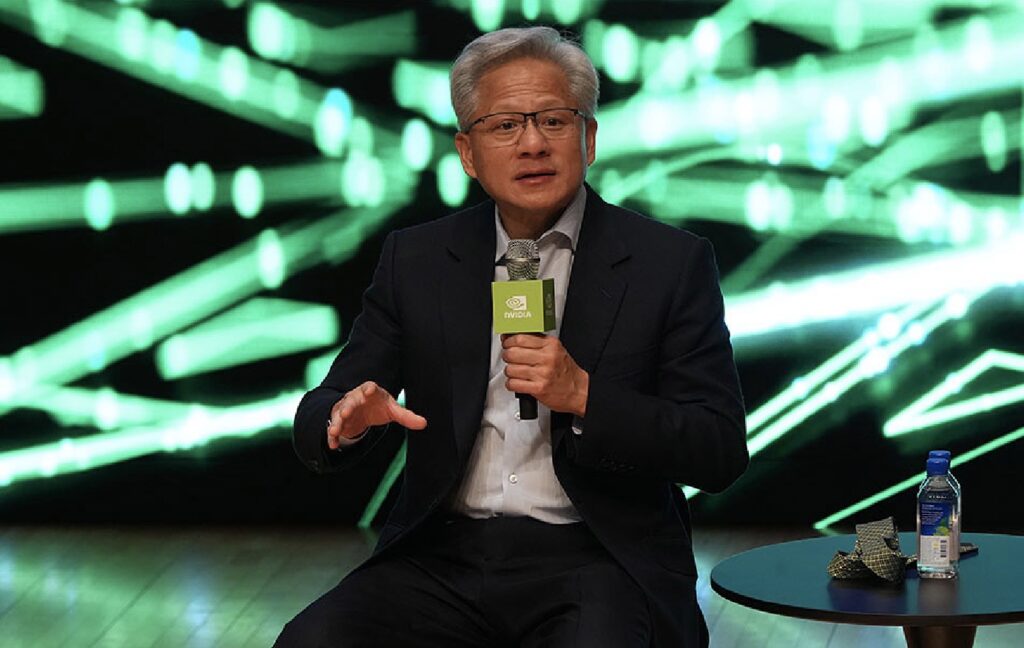Victory Giant Technology’s stock has soared 530%, turning an unassuming founder into one of China’s wealthiest tech moguls amidst a global AI frenzy.
- An Unlikely Billionaire: Chen Tao, a former soldier who once served in the Taklamakan Desert, has seen his net worth skyrocket to over $9 billion thanks to a critical manufacturing partnership with Nvidia.
- The AI Gold Rush: As a key supplier of the electronic backbones for AI servers, Chen’s company, Victory Giant, has become the top performer on the MSCI Asia Pacific Index this year.
- Navigating Geopolitics: Despite massive profits and widening margins, the company faces the urgent challenge of diversifying production beyond China to mitigate trade tensions and satisfy Western tech giants.
When Nvidia Corp. Chief Executive Officer Jensen Huang hosted a private, high-profile banquet for suppliers in Taiwan this past May, the room was a veritable who’s who of the global electronics industry. The chairmen of manufacturing behemoths like Taiwan Semiconductor Manufacturing Co. and Hon Hai Precision Industry Co. dominated the floor. Yet, tucked away in the back row of the group photo, wearing a dark shirt and an unassuming expression, stood a man few outside the industry would recognize: Chen Tao.
That understated presence belies a massive shift in the hierarchy of global tech wealth. Chen, the 53-year-old founder of Victory Giant Technology Huizhou Co., has quietly emerged as one of the most significant beneficiaries of the artificial intelligence boom. His company manufactures the printed circuit boards (PCBs)—the intricate electronic backbones essential for AI servers. As the world’s demand for Nvidia’s GPUs became insatiable, Victory Giant’s stock followed suit, surging more than 530%.
From the Desert to the Boardroom
Chen’s journey to the apex of the AI supply chain is as dramatic as the market rally he is currently enjoying. Born in 1972, Chen spent his early years as a soldier serving in China’s harsh Taklamakan Desert. After leaving the army in 1991, he initially took a safe path as a civil servant. However, a field trip to Shenzhen, the epicenter of China’s economic opening, sparked a realization that changed his trajectory.
Abandoning his “iron rice bowl”—a Chinese idiom for a secure, lifetime government job—Chen moved to Guangdong province. By 1996, he was working as a salesperson at a Taiwanese-owned PCB factory. Recognizing the immense future demand for circuit boards, he struck out on his own, founding Victory Giant (originally Shenghua Electronics) in 2003.
Today, that gamble has paid off in historic fashion. The recent stock surge has vaulted Chen and his wife, Liu Chunlan, to a combined net worth of $9.1 billion. This fortune, derived from their 27% stake in the company, places them above established global finance titans like Bill Ackman of Pershing Square and Jon Gray of Blackstone.
Riding the Nvidia Wave
For years, Victory Giant was a quiet achiever, benefiting from the general buildout of tech infrastructure without drawing global headlines. The turning point came in 2019, well before the current AI hysteria. Chen established a High-Density Interconnect (HDI) division, betting on the complex, high-end boards required for gaming graphics cards.
That strategic pivot proved prescient. As gaming technology evolved into the engines of the AI revolution, Victory Giant was perfectly positioned. By 2024, the company was supplying Nvidia’s H-series AI accelerator cards, cementing its status as a core supplier. The financial impact has been staggering: gross margins on its HDI boards leaped from 8.3% to 38.8% in the first quarter of 2025. Analysts estimate that nearly 60% of the company’s foreign sales are now linked to Nvidia.
The Geopolitical Tightrope
However, this rapid ascent is not without peril. Victory Giant is currently walking a geopolitical tightrope. The company’s heavy reliance on Nvidia, combined with its base in China, exposes it to significant regulatory risks and earnings volatility. As US-China trade tensions simmer, major Western clients are increasingly mandating supplier diversification.
“Out-of-China capacity is essential,” notes Victoria Mio, head of Greater China equities at Janus Henderson. She warns that export controls and diversification mandates from US tech giants are real threats. If Victory Giant cannot adapt, clients could easily shift to rivals like Taiwan’s Unimicron Technology Corp., Zhen Ding Technology, or Japan’s Ibiden Co.
The Race to Go Global
Chen Tao is acutely aware of these risks and is aggressively pursuing a “capacity overseas” strategy to secure his empire. The company has announced a $250 million capital injection for its manufacturing base in Thailand and is targeting a new high-end HDI base in Vietnam for March 2025. These moves are designed to serve export-sensitive Western customers while mitigating the “China risk.”
To lead this global expansion, the company has reshuffled its executive deck. Chen stepped down as president last year, handing the reins to Zhao Qixiang, whose Hong Kong residency aligns with the company’s globalization narrative. Furthermore, the company hired Victor J. Taveras, a New Zealand technology expert, as Chief Technology Officer. Taveras brings specific expertise in factory building across the US, Malaysia, and Vietnam—skills that will be critical as Victory Giant attempts to replicate its domestic success on the international stage.
The former soldier from the Taklamakan Desert stands as a titan of the new economy. But as the AI race intensifies, his ability to transform Victory Giant from a Chinese manufacturer into a truly global player will determine if his fortune is built to last.


